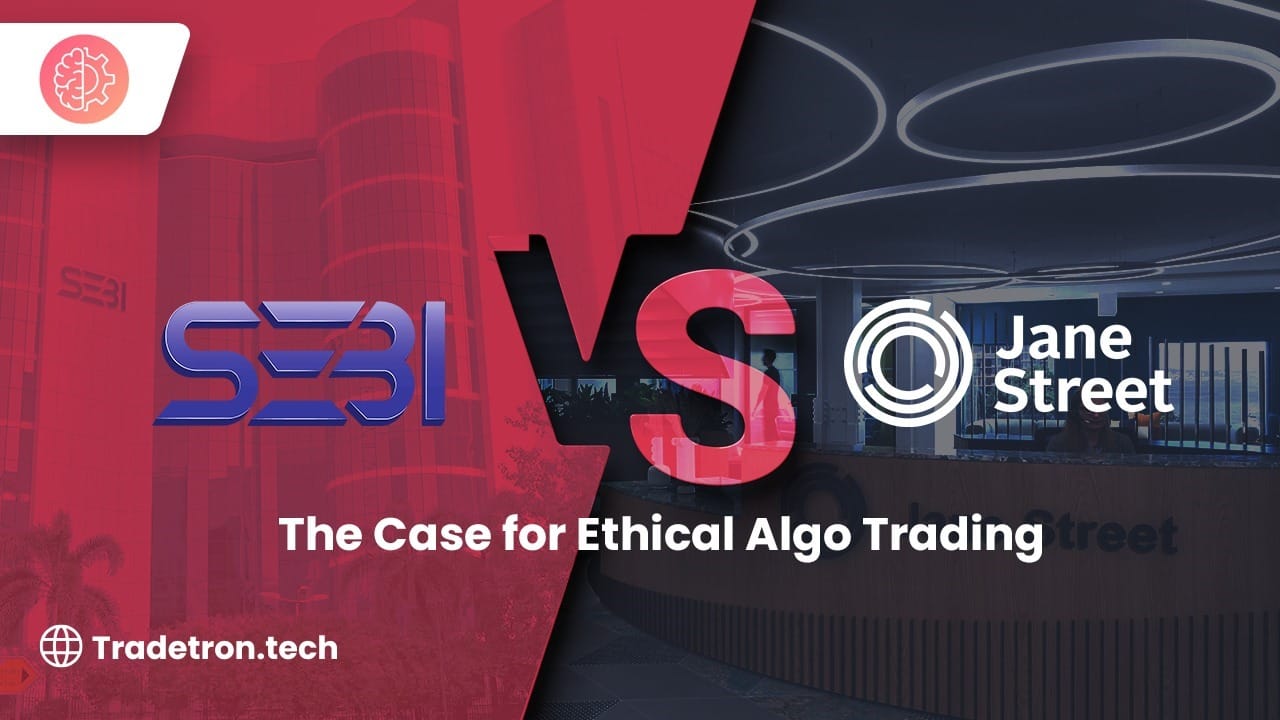
In early July 2025, the Securities and Exchange Board of India (SEBI) took unprecedented action against global proprietary trading firm Jane Street, accusing it of manipulating the Bank Nifty and Nifty 50 indices through coordinated high-frequency trades. This high-profile case highlights the fine line between strategic arbitrage and unethical market behavior—and underscores the critical importance of ethical algo trading.
The SEBI–Jane Street Dispute: What Happened
- SEBI’s Allegations: Regulators allege Jane Street engaged in a multi-step strategy: purchasing large volumes of banking stocks and Bank Nifty futures to elevate the index, then simultaneously selling call options and buying puts to profit when the index later reversed—effectively generating misleading market activity and attracting retail investors at inflated prices.
- Scope and Impact: From January 2023 to March 2025, Jane Street reportedly earned ₹36,500–43,289 crore (~$4.3 billion) in India. SEBI temporarily banned the firm from Indian markets, impounded ₹4,843 crore (~$567 million), and warned of penalties up to three times that amount if the allegations are proven.
- Jane Street’s Response: The firm labeled its activities as “standard index arbitrage,” claimed compliance with exchange investigations, and argued SEBI misunderstood its hedging practices.
Why This Matters: Algorithmic Trading on Trial
- Protecting Retail Investors: SEBI’s action stems from concern that Jane Street’s tactics misled retail investors—who reportedly suffered losses of over ₹1 trillion in derivatives—by creating artificial volatility.
- Regulatory Enforcement vs Regulation Gaps: SEBI’s chairman emphasized that current regulations are sufficient; it is robust enforcement and surveillance that matter. The agency also aims to strengthen real-time monitoring for large algorithmic traders.
- Global Precedent: This case isn’t just about India—it sets a precedent for global scrutiny of high-frequency trading firms and could reshape best practices in algorithmic trading across markets.
The Case for Ethical Algo Trading
This case underscores a fundamental principle: algorithmic tools are not inherently good or bad—it’s how they are used that defines their impact.
What Ethical Trading Looks Like
- Transparency: Trades should be clearly tied to legitimate strategies like hedging or arbitrage.
- Proportion: Algorithms should avoid overwhelming the market or distorting prices.
- Accountability: Firms must maintain clear records and cooperate with regulators.
- Fairness: Strategies must not mislead or exploit other market participants.
Markets thrive when participants trust that trades are fair and reflective of real supply and demand.
Tradetron: An Ethical Algo Trading Alternative
Platforms like Tradetron promote responsible automation by:
- Allowing rule-based automation with user-defined logic
- Supporting multi-exchange deployment without market manipulation
- Enabling paper trading and transparent reporting to test strategies
- Empowering users to retain full control and limit unintended impacts
In contrast to opaque HFT systems, Tradetron offers a transparent, accessible, and compliant framework for algorithmic trading.
Conclusion
The SEBI vs Jane Street case marks a pivotal moment in global market oversight. It reinforces the need for powerful trading tools to be guided by ethical standards and regulatory frameworks. For both institutional and retail participants, the lesson is clear: the power of automation must be matched by integrity and transparency.
In this evolving landscape, platforms like Tradetron demonstrate that sophisticated automation can be both effective and ethical—supporting innovation while preserving market fairness.
FAQs: SEBI, Jane Street, and Ethical Algo Trading
1. What exactly did SEBI accuse Jane Street of?
SEBI alleges the firm manipulated index prices through coordinated trades to influence options prices and profit at the expense of retail investors.
2. Was Jane Street’s strategy illegal?
That remains under legal review. SEBI claims it breached market conduct rules, while Jane Street defends it as standard arbitrage. A verdict is pending.
3. How does SEBI monitor algo trading?
SEBI uses exchange-provided surveillance data to flag suspicious patterns and intends to enhance real-time oversight in light of this case.
4. How does Tradetron differ from proprietary high-frequency trading?
Tradetron enables transparent, rule-based strategies under user control—unlike opaque HFT systems which may introduce market distortions.
5. Why should retail traders care?
This case directly affects retail investor protection and market trust. Platforms like Tradetron allow retail traders to automate responsibly and confidently.



 Made with Superblog
Made with Superblog